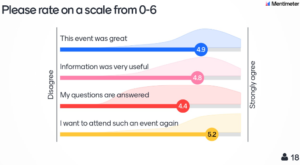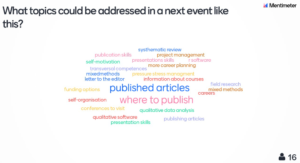Silke Bellanger, University Library Basel, and Malin Ziehmer, Swiss TPH, presented background information, tips and tricks about research data management. Upon planning research projects such as a PhD study, it is inevitable to think about one’s own data cycle from the beginning of the PhD until the end, when you should have to hand over your data to your supervisor or successor. Have you already thought about the following questions? For support on answering those questions, find more information on the corresponding Here are some tips Silke and Malin gave during the presentation: Receive the presentation by Silke and Malin including their contact information from us. Temitope Adebayo is a PhD candidate in Public Health/Epidemiology at the Medical Faculty, working at Swiss TPH. She presented her PhD project entitled “Association between short-term exposure to PM10 and cardiovascular disease in Cape Town, South Africa, 2011-2016”. The presentation was part of the bigger research that aims to develop an air quality health index (AQHI) in Cape Town. This is based on assessing the effects of multiple air pollutants on cardio-respiratory mortality. The AQHI aims to adequately report the air quality levels and the potential risk of exposure to ambient air pollution by the general population which includes people at risk (children, the elderly, pregnant women, and those with pre-existing conditions or illness) of adverse health effects. In two sessions we addressed academic and non-academic career development separately. Marianne Mathys, University of Basel, showed how to plan an academic career including possibilities at the University of Basel and information about funding. She continuously offers similar information in a GRACE course. This session showed us that participants have many questions related to their own situation. In case you have more questions, contact Marianne Mathys directly. Iris Köhler, a career coach at The Scientist Coach, spoke about ways to enter non-academic careers. She emphasized that besides exploring career options and networking, it is of utmost importance to find out more about yourself first: What are your goals, your values, your competences and what do you want to achieve in your life? What do you enjoy doing and in what kind of environment would you like to work? Writing down your answers to these questions can help with organizing your thoughts and narrowing down your career options. Melissa Amrein, PhD candidate in clinical research and PPHS student representative, moderated the student-only session ‘Communication with your supervisor’. This session gave participants the possibility to exchange their experiences and find out how they can shape the communication with the supervisor. How PhD students communicate with their supervisors varies from very positive experiences to tough situations. The latter case can arise from different expectations by each other. The discussion revealed Aron Baumann, PhD candidate in epidemiology and PPHS student representative, moderated the student-only session ‘Qualitative research – methods and course offerings’. We organized this session because PhD students approached us about the lack of advanced courses in qualitative research methods. In this session, participants exchanged information about various available courses and brainstormed about how an advanced course should look like. Here is a short summary: Existing courses were highly valued, e.g. Sonja Martens semester course on “Qualitative and mixed methods” and Elisabeth Spichigers PPHS course “Essentials in Health Research Methodology”. However, all participants felt that these resources are not providing enough information to Most participants wished to have a course that offers the opportunity to apply data analysis, preferably on their own data in the form of supervised smaller groups in a semester course. PhD students using qualitative methods would highly benefit from additional course offerings on in-depth knowledge on qualitative data analysis theory and its practical application (including software use), supervised by experienced researchers. Preferably, this course is longer than existing “short courses” and accessible online. Besides improvements in course offerings, PhD students would benefit from an overview of existing resources (e.g. university courses, online courses, etc.). The next PhD day will take place in a year. We currently plan to include longer sessions and more sessions of academic speed dating to bring your research projects into the focus. Until then, PPHS plans topic-specific events as you mentioned in the survey, as feedback to the PhD Day, and sent to us. In case you are interested in one of the following topics to be covered, let us know. …to all who contributed to our survey about topics for the PhD Day! We organized the PPHS PhD Day based on the results of a survey about what our PhD candidates are interested to hear and exchange about. The results are listed below. PhD Day 2020
The PPHS PhD Day is a yearly event to foster the exchange among PhD candidates in the Health Sciences at the University of Basel. On 7 May 2020, about 30 PhD candidates joined to learn and exchange about five topics that are summarized below.
 We thank all participants for joining; we had much fun and hope to answer more of your questions in subsequent events. Possible topics are mentioned below. In case you have other topics or are particularly interested in one, just let us know.
We thank all participants for joining; we had much fun and hope to answer more of your questions in subsequent events. Possible topics are mentioned below. In case you have other topics or are particularly interested in one, just let us know.
Research data management and your PhD: Best practices
University of Basel Research data management website or contact researchdata@unibas.ch
Temitope Adebayo presented her PhD project
Career development
Student-only sessions – ‘Communication with your supervisor’
Student-only sessions – ‘Qualitative research – methods and course offerings’
Next events
Special thanks…
Topic
Votes
Comments
Career development
26%
Covered during PhD Day, more events coming soon.
Data management
21%
Covered during PhD Day, more events coming soon, especially about data protection, documentation and publishing
Funding and finances
8%
Covered currently by GRACE
Parenting: being or becoming a parent during PhD
15%
Covered in a special event organized by PPHS and Avuba on 2 June 2020, register here
Science Communication
19%
Covered by GRACE
Other topics:
11%
These are interesting topics we can organize an event at some point.
Tips for writing manuscripts and PhD thesis
PPHS is about to organize a possibility to continuously receive writing tips and feedback by experts. Check our next newsletters or website.
Conflict management
Interesting topic! We might organize an event about that topic.
International exchange programs
Please ask here GRACE, e.g. in a funding and finances course.
What to do if you have issues with your supervisor (not enough contact, no de-
tailed help, personal issues…) who should we contact?
Covered during PhD Day, more events planned especially for exchange among students.
Work-study-life balance
Interesting topic! Maybe you can suggest a format how this question can be addressed?






